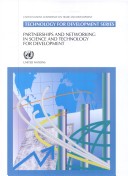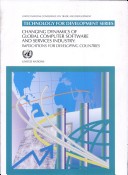Technology for Development S.
3 total works
The proliferation of inter-firm partnerships in the past few decades has raised expectations of accelerated growth and opportunities for developing countries in their efforts to catch up. However, data on formal partnerships show that the vast majority of them involve participants from developed countries. This paper addresses the relatively slow trickling down of formal partnering to the majority of firms in developing countries and argues the need for government strategies and policy intervention. It also explores informal partnering through networks and clusters as an alternative way for many developing country firms to acquire competitiveness and to meet the minimum prerequisites in terms of capabilities in order to graduate to formal partnership.
The computer software industry has the potential to become one of the most internationally dispersed high-tech industries. The last two decades saw high growth rates of this sector and a dramatic increase in the spread of computer software and services world-wide. This paper explores the issues surrounding the development of the computer software and services industry; examines how intellectual property rights affect their establishment and growth in developing countries, and discusses the implications from that for policy formulation.
Electronic Commerce and Music Business Development in Jamaica
by United Nations: Conference on Trade and Development
Published 27 September 2002
For many developing countries, including Jamaica, electronic commerce and music have been identified as an important new trading opportunity that provides one of the fastest means of penetrating global markets. The Jamaican music industry represents a vibrant and dynamic sector of the Jamaican economy, it does not currently possess the technological assets or capabilities required in order to produce and export the final product at competitive market prices. Electronic commerce presents a critical opportunity for expansion and development of the commercial dimensions of this sector at relatively low cost, particularly with regard to the promotion and marketing of music-related products and services.


